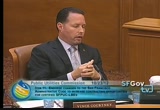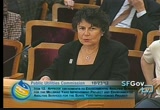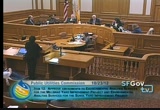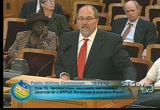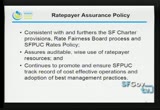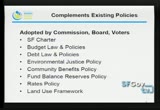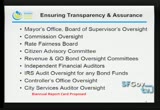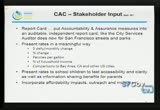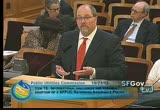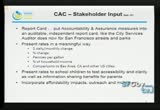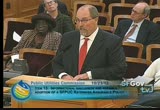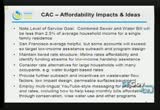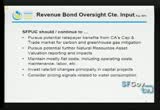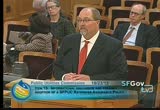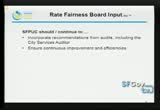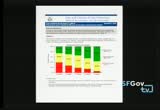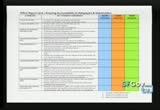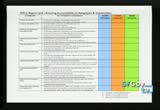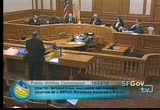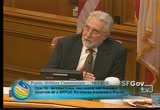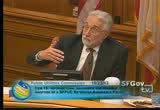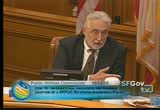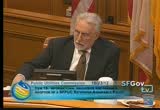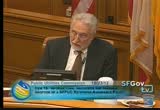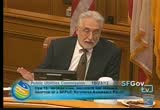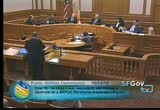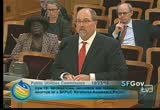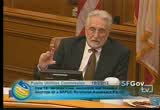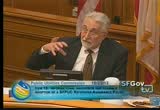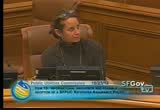tv [untitled] October 27, 2012 10:30pm-11:00pm PDT
10:30 pm
public to do that because i do recognize that there are conversations that have to take place with respect to these lbes. to the brothers and sisters that showed up today, i'm with you 100%. to the contractors who are here today, i'm with you 100%. but to the people that live in the city and county of san francisco, to the people that want this work to go to local businesses and to local contractors, you know, now i have to put my money where my mouth is and make the time to sit down and figure out if this can be better, we need to talk about making it better. and if there's things we need to take outs of it we need to talk about that. that would probably be across the hall. so, my vote is obviously to move it forward. >> any other comments? all those in favor signify by saying aye. >> aye. >> all those opposed? abstein shad, motion carries. item number 2. 12.
10:31 pm
>> item 12, [speaker not understood] authorize the general manager to execute these amendments each with a time extension of four years with no change to the value of the agreement. * >> are you -- yes. >> i was thinking that you would just say are there any questions and eula prove it. but if you'd like a little presentation, i can -- >> not a presentation, just a brief concise statement. >> sure. we have two agreements, both with [speaker not understood] corporation to prepare environmental documents for the suno yard and mill braae yard, improvement projects. and we started in may of 2010. planning and design has gone on. there have been changes in the plans. we've given it a lot of consideration for both yards and therefore the environmental
10:32 pm
review process as being slow. and for that reason we are asking for a four-year extension for both agreements. it probably won't take four years, but we don't want to come back to you again to ask for another extension. so, this is the reason for this action. and we're not asking for any additional fund. we think we have sufficient fund in the agreements to complete the work. >> and who came up with a four-year period? that's what i was wondering. >> the bureau of environmental management which i didn't introduce myself. i'm sorry, and the manager. >> so it was you and your is that of that came up with the four-year amendment? >> yes. >> that can come up with -- >> sure, shorten it or lengthen it. >> all right. any questions, any public comment? is there a motion? >> so moved. >> seconded? all those in favor by saying aye? >> aye.
10:33 pm
>> opposed, abstentions, none. carried. thank you very much. >> thank you. >> item 13. >> item 13, informational discussion and possible adoption of sfpd rate payer assurance policy. >> good afternoon, todd reese from assistant manager cfo. i want to thank you for the opportunity to look and work on this item. in particular, it gave me a chance to get out and visit with the rate service board, with the citizens advisory committee and also the revenue bond oversight committee and a number of folks, as well as go through the records and discussions that you've had as far as your ideas on how to make sure that we're well serving and best serving the rate payers and keeping things as affordable as possible. what you have before you today is a consolidation of all those notes and all those thoughts, many of which you deserve the credit for providing those to this report. and i also have a few brief slides to walk through to share with you what the citizens
10:34 pm
advisory committee that rate fairness board and our thoughts have shared, so, if i might do that. in your packet starting on page 6 item 13 is where the presentation begins. and it is in particular looking at a rate payer assurance policy. and this rate payer assurance policy is a policy to complement the many policies that you have now. you are governed and guided by the charter mandate of requirement under rate payer assurance as the voter told us to enact in 2002 in particular, one of the most recent and largest items. in addition to that, that san francisco charter provision as well as prop e and prop a in 2002, the rate service process is put into place. and you've also recently adopted during the last budget process the rates policy. this rate payer assurance policy both furthers that
10:35 pm
transparency, furthers that oversight that you see and that you help govern here in san francisco. it assures that auditable wise use of rate payer services will continue to promote and ensure that the sfpuc stays on a strong track record of effective management. one of the -- also thing in the discussions with the various stakeholder groups is to walk through all the already adopted policies and provisions and protections in place. for the public, just quickly walking through the list, there are many. there is the san francisco charter, there is the budget laws and policies, the debt laws and policies, the environmental justice policy, the community benefits policy, the fund balarie serve policy, the rates policy and the land use framework. and i go through that long list because it does provide assurances and many of which are very targeted and deliberate because of your oversight and your desire to have them. so, i think that was helpful. and i think the citizens advisory committees, the revenue bond oversight
10:36 pm
committee and the rate fairness board appreciate that and knowing that and going through that list as well. in addition to the goal that i know you and former president moran had, the assurance of transparency, we also reviewed what transparency and oversight we have now. and that includes your oversight as well as the mayor's office, the board of supervisors, the rate fairness board, of course the citizens advisory committee and all their subcommittees, which are very helpful and informative and the policy process and the information process. the revenue bond oversight committee. and we're also subject to the general obligation bond oversight committee for our auxiliary water supply system funding. we also are overseen by the independent financial auditors, the irs oversight for any bond funding that we do as well as the independent controller's office oversight and as passed in 2003 and enaccount aed in 2004 by the voters, prop c city
10:37 pm
services auditor oversight. and that may be an opportunity as well to further make audits verifiable, any potential rate payer assurance policy. what is the citizens advisory committee say? they said that this all sounds very good basically, but they want it in an easy to use report card file format, and that there is a heck of a lot of good information and requirements now. but to put it in a digestible usable way, that would be best set and the public can understand and really appreciate and have accessible accountability and assurance. >> and where would it be published? >> that is an opportunity for us to do it on our website, to put it in our popular annual report and put it into our comprehensive annual financial report, and to really put it in bill inserts or otherwise. it would provide a pretty far-reaching opportunity. they focus as well --
10:38 pm
>> that is your intent is what you're saying? >> i'm saying that the possibility is really quite good to be able to get it out in front. i'm not proscribing that we have to do that, but to the degree we want to, much like already required by city ordinance and by street a voters told the city to do back in 2003-2004 with proposition c, this may be an opportunity for us to get out our message and to say just how well and how effectively and how cost efficiently and how affordably we're providing 24/7 service to customers. so, it could be an opportunity. >> what what is the average household income in san francisco now, that the 2.5% would be based upon? >> it's $73,000 a year. >> do you know what it is statewide? >> it's lower than that. >> right. >> and i don't have it in front of me, but i'll find that -- >> whenever you get a chance, thanks. >> the other really interesting
10:39 pm
comments from the citizens have iery committee, and i know there are a few here today and mr. jones spoke earlier, is they want us to present rates in a meaningful way, dollar changes, monthly changes, dollar daily changes dollar monthly changes, percentage changes, pennies per gallon. they thought those types of metrics were helpful along with comparisons to our bay area neighbors, our california large cities as well as other u.s. cities and we have taken that already into consideration as part of our next rate study that is out right now and a request for proposal. and that's required as well as one of the rate payer protections. every five years we hire an independent rate consultant. they also asked us to consider looking at preventing ways [speaker not understood] school children clarity, and affordable outreach and monitoring. the cac had additional comments on page 6 of the presentation. looking at that 2.5% of average household income and while that was an important metric, that
10:40 pm
wasn't the only metric because a number of households would be low-income and you need potentially further assistance. they asked us to be mindful of that. and as we come back to propose rates to you, that we show how that affordability compared across the spectrum. >> on that issue, how do you deal with low-income people that are renters? which this would not necessarily apply? >> good question. so, in most cases two-thirds of us here in san francisco are renters generally. and low-income households are only about 6,000 of over 200,000, nearly 300,000 households that are low-income right now, low-income assistance program. so, it would be reaching out through our communications team, targeted reaching out to make sure what those who actually pay their own utility bill because most renters don't see their own utility bill. they're paid by the landlord. those that would be eligible for assistance knew about it
10:41 pm
and could apply for it. and, so, we look forward to that opportunity and we welcome that challenge and will support the communications as part of that process. the other things mentioned, maintaining two structures concerning rate alternatives, water based budgetses for large families so we don't distance them, somehow make it harder to live here if you have a large family in san francisco, provide further outreach as well as some incentives and wastewater flow factors, low impact design. everything in multi-lingual youtube style messaging to make sure folks understand and have accessibility to monthly bill affordability and conservation programs to make sure they can manage their bill as effectively as possible. so, really, really helpful comments. and what i found is that in all three cases, in particular for the cac, they gave us helpful comments that we cannot only use in rate payer assurance, but we can use in the rate policy and the technology
10:42 pm
policy, and the community benefits policy. so, here it's kind of a long list. i'm sorry about that. but i wanted you to know all the stuff that they shared even though it doesn't necessarily 100% apply to just assurances. revenue bond oversight is the next. it's a shorter list. pursue any potential rate payer benefits from california's cap and trade program and carbon and greenhouse gas mitigations. you recently had an item already looking at budgetary impacts of that. pursue potential and further natural resource asset valuations. we are working on that with the government accounting standards board and others. and also maintain mostly flat costs, including operating costs, maintenance and labor. and invest any rate or bill changes principally in capital projects. i think that was an overarching theme that folks looked at in our budget. you've seen that and you adopted budgets the last three to four years that are relatively flat on operations if only the plan debt service, investment capital, which you knew the voters wanted back in
10:43 pm
2002 when they passed prop a and also prop b to rebuild and upgrade. >> it's better we compare with other jurisdictions than cap and trade benefits. >> in our case, we get a relatively small amount of allocation because we have been the beneficiaries of what an incredible system that is almost completely greenhouse gas free. and, so, because of that historically with all of the large hydro power, we have a very small allocation. where we have a unique opportunity is to in particular look at carbon offsets, and, so, how we look at the rebuild of the digesters and turning cogeneration, mining power, the digestion and capturing method of nitrous oxide also covered under the greenhouse gas initiatives. those are opportunities that may produce money from thin air quite frankly. >> the people of san francisco should be proud we are ahead of
10:44 pm
the mark here. >> we are doing many things san franciscans can be proud of. the score card is one way to put it into a meaningful message for folks. we'll look to you to help perfect that. there are samples later in the presentation that are samples we would need to develop the score card over the next year i think with your input. the other thing from the revenue bond oversight is to consider price signals for water consumption and whether that be inclining blocks or otherwise. the rate [speaker not understood] board had been briefed a great deal and they are asking that we incorporate recommendations from all previous audits in the city services auditor and we go through the quarterly update we give you because you ask us the same, to have that continued follow-up. and ensuring continuous improvement. so, the next steps for us would be to consider implementation, to look at the draft policy that's in front of you, and then possibly over the next
10:45 pm
budget cycle, because this is an off year as far as our two-year budget so we have a mid year review. one of the items could be to look at that score card or report card idea and actually use some of our -- what would previously have been budget hearing time to look at what a helpful one-page report card for our entity would be. the sample before you are samples, the first one is what voters requested that the independent controller city service auditor do for parks. you can see it simplified to one page with parks that are clean and tide y and green, and those starting from the left, there were a lot of parks in disrepair when this started in '05, '06. but parks have really improved and become more clean and usable. that's a nice report card style. but the report card on streets
10:46 pm
and street cleanliness and graffiti and trash receptacles and trees is a little more detailed and quantitative. but it shows a multi-year trend and summarizes in one page if we wanted to see what the status and health and cleanliness of streets and sidewalks would be. these are both independent score cards, report cards that the controller's office is doing, the city services auditor the board asked them to do. taking that same theme, the city services advisory of the sfpuc thought we might want to consider that as a way to synthesize and distill it into a report card to rate payers on how we're doing. so, what i've done here is purely an example, but it is rap based upon the rubric that the water environment foundation and also the american water works association says are the 10 attributes for an effective utility management function. and a number of these attributes you'll see look very
10:47 pm
familiar to what you have as strategic sustainability goals as well as your items to the bottom line policies and other. so, what could be the possibility in next step is to perfect this report card style. and you see a column for each one and whether we have a path that needs improvement, that would be a one-page summary of how we're doing. so, that's a great deal -- i talked quite a long time, and, so, if there are any questions, i'd be happy to try to help. >> i think it would be very helpful having once represented a district that was very low-income in los angeles as to where these parks are that are still left outstanding, the 14 you mentioned. are they in neighborhoods we should be concerned about or are they all over the city? >> so, what is really nice about what the city services auditor has done, the report card they do for parks and
10:48 pm
streets extends to one page, there is a large report that is attached to it. so, what will go through a geographic map and show where those parks are in the case of parks, in the case of streets and sidewalks, similarly for them. as we develop our score card, we could ask specific questions about service and reliability and water quality and supply assurance, earthquake preparedness by neighborhood as examples if that would be helpful. >> can i get a copy of that raoerth? >> yes. * report for the viewing public, both the reports for streets and parks are at the controller's website. >> any questions? commissioner moran. >> thank you very much. this is a policy that's been in the works for sometime. i don't know when we first started talking about it, but it was a year ago. >> yes. >> and it comes out of a real
10:49 pm
concern that our financial plans and projections show a continuation of a very steep increase in rates over time. and we have in the past had rate backlash that resulted in a rate freeze. i expected at some point we are going to be under a great deal of scrutiny to demonstrate that we have spent the people's money wisely. as we ask for more of it, the threshold question will be, how did you do with the stuff we already gave you? so, the intent of the policy was to provide a set of assurances to rate payers that as we spend your money, we will do it consistent with law and also as wisely as we possibly can. also wanted to make sure this wasn't just a bunch of words.
10:50 pm
we wanted it to be structured in such a way that somebody could audit it and could go in and take a look at our performance and say, you set out to be good guys, how have you performed against that? as we stand before our rate payers to be able to say, we have committed to managing your money well, we have been audited by the controller against our objectives, and we have an answer on that. hopefully that answer will be that we have met and exceeded all of those objectives. so, i think it's very important. and i think over the course of the last year, the various drafts of this policy have improved significantly, and i think it's been worth that time. i also wanted to note the comments that we received from cac and -- especially chc had a
10:51 pm
bunch of recommendationses that deal with rate setting. that is not the particular purpose of this policy. we do have a rates policy. i think they raise some great questions, and i think it would be well worth our time to take a look at the rate policy that we have, the recommendations that we have from the cac, and see if we should be making changes to the rate policy to deal with some of the issues that they raise. chief among them, frankly, is that the average income in the city may be $73,000 per household, but there's a whole lot of people that don't even make half that. so, what may be reasonable the average san francisco household may be quite a burden for people. and we need to be able to address that in some way. there are some constraints in state law as to what we can do on that, but we need to address that issue if we hope to have
10:52 pm
the continued support of all of the communities of this city. so, i think those are very important comments. i don't think they apply really to this policy, but i think that as we go forward, i think taking a look at the rate policy and dealing with though issues i think would be very helpful. the bond oversight committee did have some comments that i think do impact this policy quite directly. specifically, the one -- the incentive i like aside from the fact we are committing to try to do a bunch of stuff, there should be some objective that you actually accomplish it in some way. some outcome-based objective. and they suggested that we maintain operating costs as being flat. what i have worked with staff on is an amendment that i would like to propose to the policy
10:53 pm
that would accomplish -- i'll read it, it's very short. it adds a section called operating cost containment. it would read, to the extent that operating costs are determined by puc actions and choices, it is the policy of this commission to limit operating cost increases exclusive of debt service and cash funded capital investment to no more than the cost of inflation. any budget increases above this level will be supported by findings of necessity, adopted by the commission, and detail the specific reasons and needs for increases above the rate of inflation. the intent is to recognize -- first of all, we're not entirely in control of our own costs. rates are set by m-o-us. [speaker not understood] so, we don't have control over everything. for the things that we do control, cost containment is an
10:54 pm
important objective. i don't think we should tie our hands and say that it will have to be flat. there may be good and sufficient reasons that we have to go above that. but if we do, we need to explain why. what those requirements were, how it calculates to an impact on the rates, and why that is a necessary thing for us to do. and there was basically nothing else we could do to offset those costs some other way, that we owe it to ourselves, we owe it to our rate payers that we make that kind of a finding. so, i think that's a very valuable addition. i'm sorry? >> where would you place the language? >> i think inserting that after the sustainability paragraph right before the report card might be addition emphasis as we're doing that report card. it can go many places. * additional
10:55 pm
>> it's meant to conform with the general structure and exactly where it goes -- >> we'll figure it out. >> yeah, i would leave staff to figure it out. >> mr. president, can i ask a question? >> yes. >> so, when you said personnel costs, how does that reflect in this statement? what part of operating costs? >> it's a cost of inflation, but you don't control a decision on that. >> what i would expect is if labor rates are driving operating costs above the rate of inflation, number one, we would try to figure outweighs to compensate for that mistake with an adjusted flat budget. if we were unable to do that, the statement of necessity would be, but labor rates have exceeded the rate of inflation for this year. we are obligated to meet them. that we have looked at
10:56 pm
compensating steps and have not been able to recover that cost increase and it's necessary to pay our employees fairly and to make it a work force to do the job. that is an explanation. if it goes above the rate of inflation, we have to explain that to people. and if it's stuff that we can't control, we can explain. anyway. that would be my intent on that. >> on that item, i think we would also want to be mindful -- i know the labor unions have been very helpful to san francisco in taking pay cuts and tree duckses in some years as well. so, payments have gone down in additional contributions. i know a lot of what you do with policy deliberations is multi-year ten-year cap plans, multi-year sewer system rebuild plans. so, we'd be mindful of that multi-year rate planning as well. clearly those years where salary costs go down because of labor concessions and helpfulness in a bad economy.
10:57 pm
>> i think within the typesful things that rates pay for, the easiest to explain are bond issues. especially if it's a bond issue like the bond that were approved by the voters, you asked us to do it, you gave them monies, we promised to repay the loans that we have taken out. that's why your rate went up by this amount. that's very ease toy explain. it buys you seismic safety and reliability. that is an easy explanation to give. the hardest one to give is within operating. operating funds, so many things, some big, some small, that is just hard to explain it. now, if we start from a position that we want to keep things as loud as we can and provide explanations as to the forces, if any, that drive you above that, then i think that goes a long wail to completing an understandable story as to why rates have to be what they have to be.
10:58 pm
>> what form do you want this to take? >> i will move this as an amendment to the policy that is in front of you. >> i was just going to ask you to read it again just to be -- because we don't have handouts for any members of the audience. i just wanted to make sure it's clear on the record what you're moving. >> okay. so, add a section to the policy that's in front of the commission. the placement of that addition to be left to staff. and the addition to be titled operating cost containment and to read as follows. to the extent that operating costs are determined by the puc, actions and choices, it is the policy of the commission to limit operating cost increases exclusive of debt service and cash funded capital investment to no more than the cost of inflation. any budget increases above this level will be supported by
10:59 pm
findings of necessity, adopt {speaker not understood] >> we would want to hear a good valid argument. >> yes. >> and the criteria by which to make a decision. what if there is some kind of immediate need or disaster, an emergency where it's all hands on deck and there is an operational impact? >> well, first of all, any emergency -- these are objectives, as a policy, it is an objective. it is not a limitation on expenditure. any legal expenditure could be made by staff to deal with any necessities they would have. there is nothing in here that d
112 Views
IN COLLECTIONS
SFGTV: San Francisco Government Television Television Archive
Television Archive  Television Archive News Search Service
Television Archive News Search Service 
Uploaded by TV Archive on

 Live Music Archive
Live Music Archive Librivox Free Audio
Librivox Free Audio Metropolitan Museum
Metropolitan Museum Cleveland Museum of Art
Cleveland Museum of Art Internet Arcade
Internet Arcade Console Living Room
Console Living Room Books to Borrow
Books to Borrow Open Library
Open Library TV News
TV News Understanding 9/11
Understanding 9/11